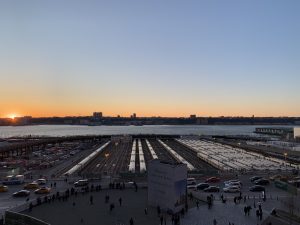
Resting trains at the West Side Yard. Photo Credit: Isabel Wong
Every few months, I will, without warning, run headlong into post-graduation panic. Having just woken up, I’ll meander into the kitchen, pop a slice of bread into the toaster and check my phone to learn my friend has landed an internship or my other friend is beginning the postgraduate fellowship essay grind. I am sent spiraling. Not so much from the news as from its movement. For whether they’re accepting or interviewing, each is on their way. Trunks loaded, snacks open and waiting, some already pressing foot to pedal. All of them operating in next steps. And here I am left, phone in hand, unsure where I’m going let alone whether by boat, by car, by plane, by foot.
Scared of graduating without an offer or acceptance, I nosedive into LionShare, flagging opportunities four, seven pages in. Sometimes, the panic plunges to my core, makes me question my interests, whether education or writing is really for me. Seconds later my computer’s loading 20 tabs differentiating a JD from an LLM, a micro from a macro social worker.
A couple months ago, I found myself in particularly deep waters. Convinced I needed to keep the option of law school open, I started studying for the LSAT. Recognizing that applying to law school is a decision best not made on a downward tumbling whim, I met with a Center for Career Education advisor who suggested I both think, and perhaps even free write, further about my fields of interest and reach out to people in those industries.
Like any college student on a deadline, I wanted definitive answers immediately whereas the advisor’s recommendations felt liable to only prolong my search for answers. Eventually, though, I surrendered to the advisor’s second suggestion. I had been meaning to email one of my high school teachers and figured I may as well mention my interest in teaching at the same time. As I tried to condense my winding academic path into a straight, jaunty stroll, I kept returning to certain signposts whose guidance lit my path. These professors, classmates, friends had conferenced with me for hours, welcomed me into their apartments, called from halfway across the world. They inspired me, encouraged me, empathized with me. Mentors, I realized, were the reason I was where I was, and mentorship the crux of my desire to be an educator.
Exchanging laptop for notebook, I finally took up the advisor’s first recommendation. Less of an epiphanic declaration and more of a list with side note commentary, my bullet points centered on what I valued and hoped for from a workplace, work, and people in general. The attributes I uncovered were neither particularly niche nor novel, but in writing them down, I gave them the bullhorn they needed.
When applying for anything, I always refer to CCE’s Design Your Next Steps guide. Cramming for an interview, I completely bypass the opening pages, which walk one through how to identify opportunities based on one’s interests, values, traits, and skills, and skip to the interview section, which states that the first step to preparing for an interview is to research the company. I regret never having read through those opening pages. If I had taken the time to scrutinize myself, realized working with people actually energized rather than tired me, maybe I wouldn’t have chosen an internship anchored to a desk my sophomore year, wouldn’t have felt so drained riding back on the subway each day.
Similarly, in research, we often dive straight into the subject, the company, ignoring the researcher, ourselves. But researching the researcher, researching the self, is just as critical to research as researching the subject itself. Who we are, what we value, what belief systems we hold inform our analytical lenses, methodologies, sources, assumptions, and biases. We learn to analyze privileges authors’ identities may afford them, to assess the resources and perspectives available to them, to consider the societal constraints and freedoms governing their movements. The Florentine Codex reads differently depending on who penned it.
Positionality can inspire research, but it also regulates it, can limit it. We approach other authors with caution and must subject ourselves to the same treatment. When researching, we must grapple with readers’ questions and publish our responses, both for others’ benefit and our own accountability. If we are committed to transparent research, to accountable researchers, to centering communities rather than ourselves, then we cannot stop, or even start, at researching our “subjects” without first, and then continuously thereafter, researching ourselves.
